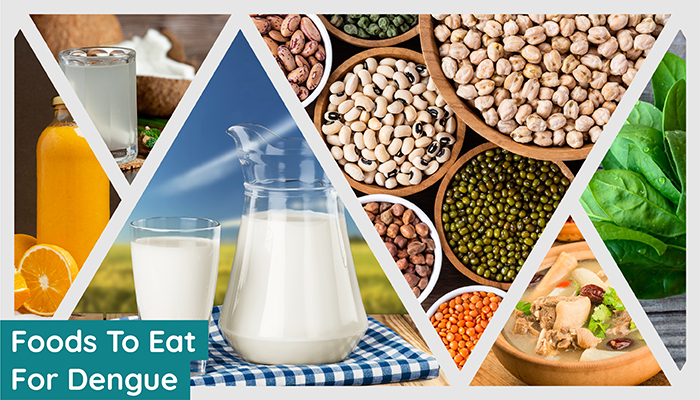What is Dengue?
Dengue is an infectious disease. When the dengue virus enters the human body, your immune system gets compromised and loses its ability to fight or kill infections. It also weakens the immune system. Moreover, a weak immune system becomes a breeding ground for various other conditions. Therefore, you need to take measures to ensure your immune system remains as healthy as possible.
One way to do so is by ensuring you maintain a proper diet during and a few days following your recovery from dengue. Your dengue diet during the treatment course should include immunity-boosting foods, foods rich in protein, iron, vitamin C, etc., as they help combat the infection. Additionally, it helps to increase your liquid intake, as a dengue infection can lead to dehydration.
What Happens To Your Body When You Contract Dengue
Dengue is a mosquito-borne disease prevalent in tropical and sub-tropical countries like Latin America, South Asia, Southeast Asia, Africa and Western Pacific Islands. The female mosquito Aedes aegypti transmits the dengue virus from infected humans to others through saliva. The virus starts reproducing itself upon entering the bloodstream. The white blood cells (WBC), which make up the body's immune system, produce antibodies to kill the virus. In this process, the body loses WBCs and blood platelets, leading to symptoms like appetite loss, dehydration, and vomiting.
Diet For Dengue Patients : Best Foods For Dengue
Doctors typically recommend a strict diet for dengue patients throughout the dengue treatment course. They suggest the following food types that can help replenish the lost nutrients making them an excellent food for dengue patients.
- Papaya Leaf Juice: Papaya leaf extract proves effective in treating thrombocytopenia, one of the crucial symptoms of dengue fever. It causes your blood platelet count to drop rapidly, which subsequently prevents your body from blood clotting and leads to haemorrhages. Dengue patients can benefit from consuming papaya leaf extract with water.
- Oranges
- Oranges are high in Vitamin C. Also known as ascorbic acid, Vitamin C is a potent antioxidant that keeps your immune system functioning. Vitamin C facilitates the migration of white blood cells to the infected areas while protecting the tissue from excessive damage. You can consume whole oranges or juice them.
- Meats and Eggs: Meats and eggs are rich in protein, and proteins are made of amino acids. Amino acids improve the germ-fighting abilities of thymus cells (T-cells), bursa-derived cells (B-cells) and other antibodies. A warm bowl of chicken or mutton soup can speed healing and make up for lost appetite and dehydration due to dengue symptoms like vomiting, diarrhoea, etc. A plain omelette or hard-boiled eggs is an ideal addition to your dengue diet.
- Legumes and Green Leafy Vegetables: Dengue causes your body's platelet count to drop significantly. Iron is essential for forming erythrocytes (red blood cells) and, in turn, blood platelets. Legumes like soybeans, chickpeas, peanuts, lentils, etc., are rich in iron. Leafy green vegetables, especially spinach and kale, are excellent foods to increase platelet count in dengue patients.
- Dairy: Dairy products like milk provide zinc, protein, vitamin A, selenium, etc., which are immunity-boosting nutrients. Curd is also a good source of zinc and protein. It is also high in probiotics and keeps your gut healthy. Probiotics contain live bacteria, which can more efficiently boost your immunity than supplements.
- Coconut Water: Coconut water has electrolytes, potassium, calcium and magnesium. It also contains antioxidants that help to keep your immunity levels high, making it hearty food for dengue patients. Your body loses a lot of water from vomiting and diarrhoea. Therefore, it is important to drink natural drinks like coconut water to keep yourself hydrated.
- Herbal Tea: Note that regular tea is rich in caffeine and so dengue patients must avoid it while undergoing treatment. However, you can substitute your tea cravings with herbal teas like chamomile, ginger, peppermint, etc. Herbal tea can relieve dengue symptoms like headaches, nausea and body pain.
Diet for Dengue : Dengue Foods To Avoid
Some foods alleviate the symptoms of dengue, while some can make it worse. The following is a list of foods to avoid for dengue patients.
- Caffeine: Caffeinated drinks like tea and coffee increase the heart rate. Caffeine is also mildly diuretic – i.e., it increases the frequency of urination. Therefore, when your body is already so dehydrated, it is best to avoid caffeine until you recover.
- Spicy Foods: Spices typically help in digestion as they stimulate acid production in the stomach. However, when you have dengue, you are at risk of gastrointestinal tract bleeding. You should thus refrain from consuming spicy foods and stick to a soft and bland dengue diet.
- Fats: Dengue makes it difficult for your digestive system to break down fats. They also increase your blood pressure. Thus, fatty cuts of meat, fried food, junk food, etc., are among the foods to avoid for dengue patients.
Additionally, you should avoid painkillers like aspirin. They make the blood thin, which can amplify haemorrhaging.
References:
- Importance of proper nutrition in dengue infections. IP Journal of Nutrition, Metabolism and Health Science [Internet]. https://www.jnmhs.com/article-download/full-text/17975. Accessed Dec 10, 2022.
- Micronutrients and Dengue. The American Journal of Tropical Medicine and Hygiene [Internet]. https://www.ajtmh.org/view/journals/tpmd/91/5/article-p1049.xml. Accessed Dec 15, 2022.
- Dengue Fever: How to Recover Fast. HealthXchange.sg [Internet]. https://www.healthxchange.sg/women/health-scares-outbreaks/dengue-fever-how-to-recover-fast. Accessed Dec 20, 2022.
- Prevention and control of dengue by diet therapy. International Journal of Mosquito Research [Internet]. https://www.dipterajournal.com/pdf/2017/vol4issue1/PartA/4-1-10-484.pdf. Accessed Dec 22, 2022.
- Dengue Fever: Follow This Post-Dengue Diet Plan For Fast Recovery. NDTV. https://www.ndtv.com/health/dengue-follow-this-post-dengue-diet-plan-3541638. Accessed Dec 20, 2022.
- Have All Fruits in Diet with Curative Properties during Dengue Fever Treatment. Agriculture & Environment E-newsletter. https://www.researchgate.net/publication/346629046_Have_All_Fruits_in_Diet_with_Curative_Properties_during_Dengue_Fever_Treatment . Accessed Dec 21, 2022
